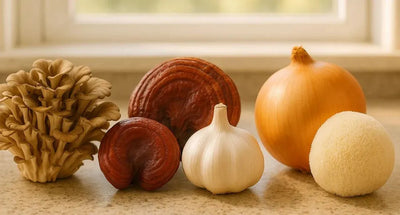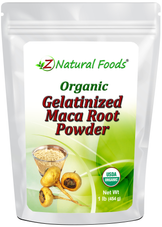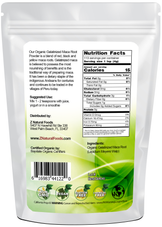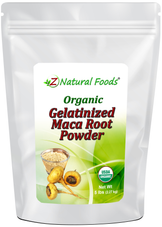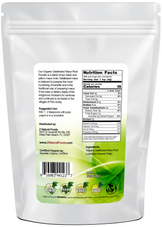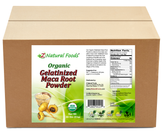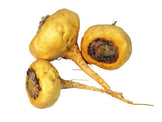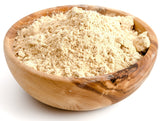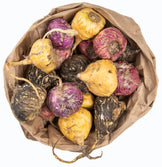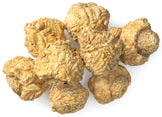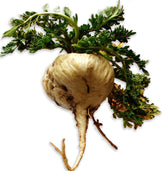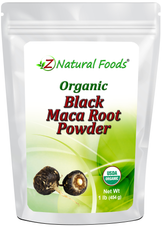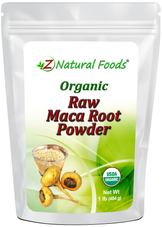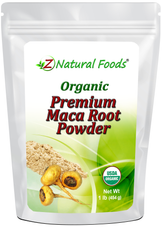Description
Description
To understand the potential effects Maca has on a woman’s body, the following question must be answered…..
Can an herb support specific results based on gender?
One common question we often receive about herbs is regarding their relationship to specific gender-based conditions and if it is possible to support particular mechanisms of action to create a more gender-based targeted approach.
What Does Maca Root Do to a Woman's Body?
Maca does not differentiate between a man's and a woman’s body. Maca is providing nourishment and support for a broad spectrum of actions. This, in turn, gives the body the tools to deal with the effects of daily stress and how it may manifest in the individual.
When used in its whole form, no herb supports a specific target outcome to one gender over another.
However, let’s now cover two particular factors, herbal preparation and formulation, that do change the landscape when trying to support a specific gender-based effect.
Following the discussion of these two factors, then we will review how maca actually works and finish this helpful article with three remarkable studies featuring maca and women’s health.
2 Factors that affect herbs to support a gender-based effect
1. The preparation of the herbal medicine
This area is the most profound when looking at an herb's targeted effects on a specific gender. There are many preparations of herbal medicines, but the one that can most profoundly change the landscape for which gender may gain more significant benefit is known as an “isolated” standardized preparation.
An isolated standardized herbal preparation is often the first line of defense for gender-specific issues or to support a specific mechanism of action. It isolates and concentrates compounds in the herb that are believed to be the primary reasons for the particular results. The purpose is to get a targeted response.
When hundreds of compounds naturally occur in a plant, they work together synergistically to provide a balanced effect with broad mechanisms of action.
When you isolate and concentrate one or a family of the compounds found in an herb, it can dominate the impact of the overall preparation, so you end up with a different result.
With this type of preparation, you will get a drug-like effect because isolating and concentrating specific constituents takes a balanced herb and creates something completely different.
You typically see isolated standardized preparation as the gold standard for conditions-specific products. This preparation technique is not better or worse; it simply helps support a specific targeted approach.
There are also some examples of highly concentrated full-spectrum extract preparations that have been shown in isolated studies to support specific targeted actions.
It is believed the targeted results of using this type of preparation are based on the high concentration of constituents, which can be from ten to a hundred times higher than the whole herb itself.
2. The Formula of the herbal medicine
An herbal formula is more than a list of herbs randomly put together to target a condition. If it is going to be effective, many things must be considered, including:
- The energy or constitution (cooling, warming, drying, moistening) of each herb
- How the herbs work together to support or modulate their individual effects to create harmony within the body
- The individuals' constitution and personality
- The part of the plant being used
- The preparation of each herb within the formula
If appropriately formulated and all of these individual factors are considered, it can profoundly affect the outcome and whether specific mechanisms of action are targeted.
Gender-based responses to maca and other herbs
Why can both men and women use an herb like maca root and get such profoundly different effects?
The reality is: that Maca does not differentiate between a man's and a woman’s body.
It is simply providing nourishment and support for a broad spectrum of actions.
This, in turn, gives the body the tools to deal with the effects of daily stress and how it may manifest in the individual. These different responses to stress produce the same initial chemical reactions in both men and women, like increased cortisol levels.
- The effects of increased cortisol have a chain reaction that directly affects all glands, which are major hormone producers in the body.
- With men being testosterone dominant and women being estrogen dominant, the result of this assault on the body manifests very differently.
- Another reason for the difference in how the stress response manifests is the individuals' inherent weaknesses.
- In simple terms, maca or any herb used in this situation that has a broad spectrum of effects indirectly impacts the individual's response to the stressor.
How does Maca work?
Maca has quite a reputation for its ability to revitalize one’s vitality and energy. Maca contains potent compounds, providing the body with a beautiful synergy of nourishment.
Macamides, Macaenes, and glucosinolates seem to be what research feels may help to give maca some of its possible supportive effects.
The research has been quite conclusive in determining that it is most potent as a whole concentrated food (versus standardizing it).
While macamides, macaenes, and glucosinolates are only found in small amounts, the synergy of these compounds packs a powerful punch. What makes maca unique, it’s the only food in the Brassicaceae family where this combination of compounds occurs.
According to a research paper titled “Ethnobiology and Ethnopharmacology of Lepidium meyenii (Maca), A Plant from the Peruvian Highlands,” the following stated about its primary nourishing qualities:
- A more complete description of the composition of dry maca shows 10.2% proteins, 59% carbohydrates, 2.2% lipids, and 8.5% of fiber.
- Free fatty acids are also present in maca, the most abundant being linoleic, palmitic, and oleic acids.
- Saturated fatty acids represent 40.1% whereas unsaturated fatty acids are present at 52.7%”. (1)
Maca contains amino acids (mg/g protein) like:
- leucine (91.0 mg),
- arginine (99.4 mg),
- phenylalanine (55.3 mg),
- lysine (54.3 mg),
- glycin (68.30 mg),
- alanine (63.1 mg),
- valine (79.3 mg),
- isoleucine (47.4 mg),
- glutamic acid (156.5 mg),
- serine (50.4 mg), and
- aspartic acid (91.7 mg).
Other amino acids present but in less proportion are:
- histidine (21.9 mg),
- threonine (33.1 mg),
- tyrosine (30.6 mg),
- methionine (28.0 mg),
- hydroxyproline (26 mg),
- proline (0.5 mg), and
- sarcosine (0.70 mg).
Minerals reportedly found in maca were:
- iron (16.6 mg/100 g dry matter),
- calcium (150 mg/100 g dry matter),
- copper (5.9 mg/100 g dry matter),
- zinc (3.8 mg/100 g dry matter), and
- potassium (2050 mg/100 g dry matter)
Contrary to popular belief, the effects of maca on different physiological processes do not seem to be regulated by direct changes to hormone levels.
For example, sexual desire is controlled by the balancing of hormone levels.
The specific effects maca has on one’s vitality is not because it directly affects individual hormone levels but because the natural sterols in maca perform healthy “hormone-like functions.”
The macamides and macaenes found in maca may, in fact, influence brain centers responsible for regulating the endocrine system and energy levels.
3 Maca Studies Focused on Women’s Health
The three studies below on women show some examples of how maca may support some important health benefits:
1. Maca study on women: Decreased blood pressure and depression with no change in hormones after maca treatment
A randomized, double-blind, placebo-controlled, cross-over study was conducted on 29 post-menopausal women. They received 3.3 g/day of Maca or placebo for six weeks each, in either order, over 12 weeks. At baseline, week six, and week twelve, estradiol, follicle-stimulating hormone (FSH), sex hormone binding globulin (SHBG), stimulating thyroid hormone (TSH), total lipid profiles, glucose, and serum cytokines were measured. The Greene Climacteric, SF-36 Version 2, Women's Health Questionnaire, and Utian Quality of Life Scales were used to assess the severity of menopausal symptoms and health-related quality of life.
The results showed no differences in estradiol, FSH, TSH, SHBG, glucose, lipid profiles, and serum cytokines amongst those who received Maca compared to the placebo group; however, significant decreases in diastolic blood pressure and depression were apparent after Maca treatment.
In this study Maca did not directly cause a biological action in the small cohort of patients studied but the study found that Maca played a supporting role in significant health benefits. (2)
2. Maca study on women: Improved sexual function and improved libido after maca treatment
A double-blind placebo-controlled trial of maca root as a treatment for antidepressant-induced sexual dysfunction in women concluded,
“Maca root may alleviate AISD (antidepressant-induced sexual dysfunction) as women age, particularly in the domain of orgasm.”
It also stated, “It expands on the findings of our first open-label study (in which 85% of the participants were women) that demonstrated notable mean improvement in sexual function, with the most robust and statistically significant improvement in those subjects receiving 3.0 rather than 1.5 grams of maca per day. In that study, maca also significantly improved libido in the ITT sample, particularly in the high dose group”. (3)
3. Maca study on women: Less pain, lower blood pressure, reduced body weight, and lower triglycerides after maca treatment
Here is an excellent study based on the trademark raw material Maca-GO. Maca-GO is a highly concentrated (10:1) pre-gelatinized Maca extract capsule.
This four-month, double-blind, crossover, randomized pilot trial looked at the specific effects of Pre-Gelatinized Organic Maca (Maca-GO) on quantitative physiological responses and alleviation of symptoms contributing to menopausal discomfort in perimenopausal women.
The following blood constituents were taken:
- Estrogen (E2),
- Follicle Stimulating Hormone (FSH),
- Luteinizing Hormone (LH) and Progesterone (PGS),
- Cortisol (CT),
- Adrenocorticotropic Hormone (ACTH),
- Thyroid Hormones (TSH, T3, T4),
- minerals (Ca, K, Fe) and
- lipid profile (Triglycerides, Total Cholesterol, LDL, HDL).
A group of 20 women (aged 41-50 years), who fulfilled the criteria of being in the perimenopausal stage (E2 above 40pg/ml and FSH below 30IU/ml), were randomly allocated to two even groups, one receiving two months of Maca-GO and the other Placebo capsules followed by a crossover with treatment change for another two months. All participants signed informed consent to participate. Two 500mg hard capsules with Maca-GO or Placebo were self-administered by participants twice daily with meals (total 2g/day).
Results: Two months of Maca-GO administration significantly alleviated discomfort symptoms observed in most women in the study (74%-87%). The results showed an increase in E2 and FSH, progesterone, and ACTH levels and a reduction in blood pressure, body weight, and triglycerides.
Conclusion: Pre-gelatinized Maca-GO may be a valuable non-hormonal plant possibly alleviating negative psychological and physiological symptoms experienced by women in the premenopausal stage of life.
It appears that Maca-GO may act as a toner of hormonal processes.
References:
1)Gustavo F. Gonzales. 2011. “Ethnobiology and Ethnopharmacology of Lepidium meyenii (Maca), a Plant from the Peruvian Highlands” Pubmed.gov. Accessed 3/23/18 https://www.ncbi.nlm.nih.gov/pmc/articles/PMC3184420/
2)Brooks NA1, Wilcox G, Walker KZ, Ashton JF, Cox MB, Stojanovska L. 2008. “Beneficial effects of Lepidium meyenii (Maca) on psychological symptoms and measures of sexual dysfunction in postmenopausal women are not related to estrogen or androgen content.”. Pubmed.gov. Accessed 3/23/18 https://www.ncbi.nlm.nih.gov/pubmed/18784609
3)Christina M. Dording, 1, * Pamela J. Schettler, 2 Elizabeth D. Dalton, 1 Susannah R. Parkin, 1 Rosemary S. W. Walker,1 Kara B. Fehling, 1 Maurizio Fava, 1 and David Mischoulon. 2015 “A Double-Blind Placebo-Controlled Trial of Maca Root as Treatment for Antidepressant-Induced Sexual Dysfunction in Women” Pubmed.gov. Accessed 3/23/18. https://www.ncbi.nlm.nih.gov/pmc/articles/PMC4411442/
4)H O Meissner, H Reich-Bilinska, A Mscisz, B Kedzia. 2006 “Therapeutic Effects of Pre-Gelatinized Maca (Lepidium peruvianum Chacon) used as a Non-Hormonal Alternative to HRT in Perimenopausal Women - Clinical Pilot Study.” Pubmed.gov Accessed 9/5/22. https://pubmed.ncbi.nlm.nih.gov/23674976/

